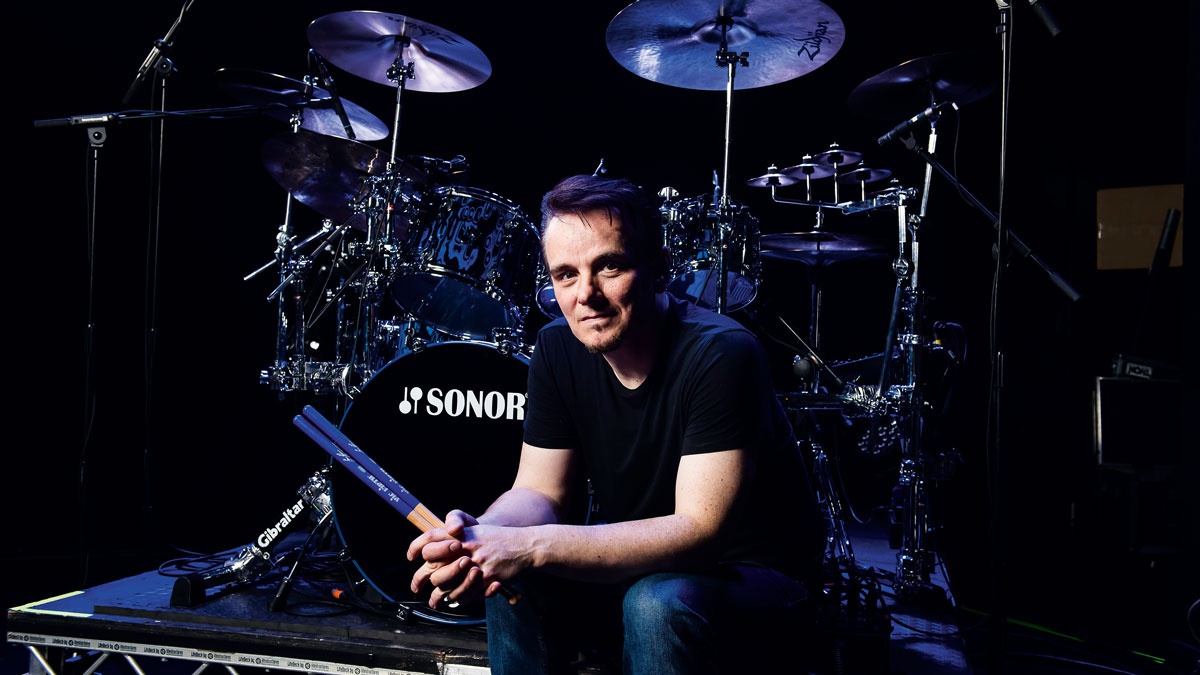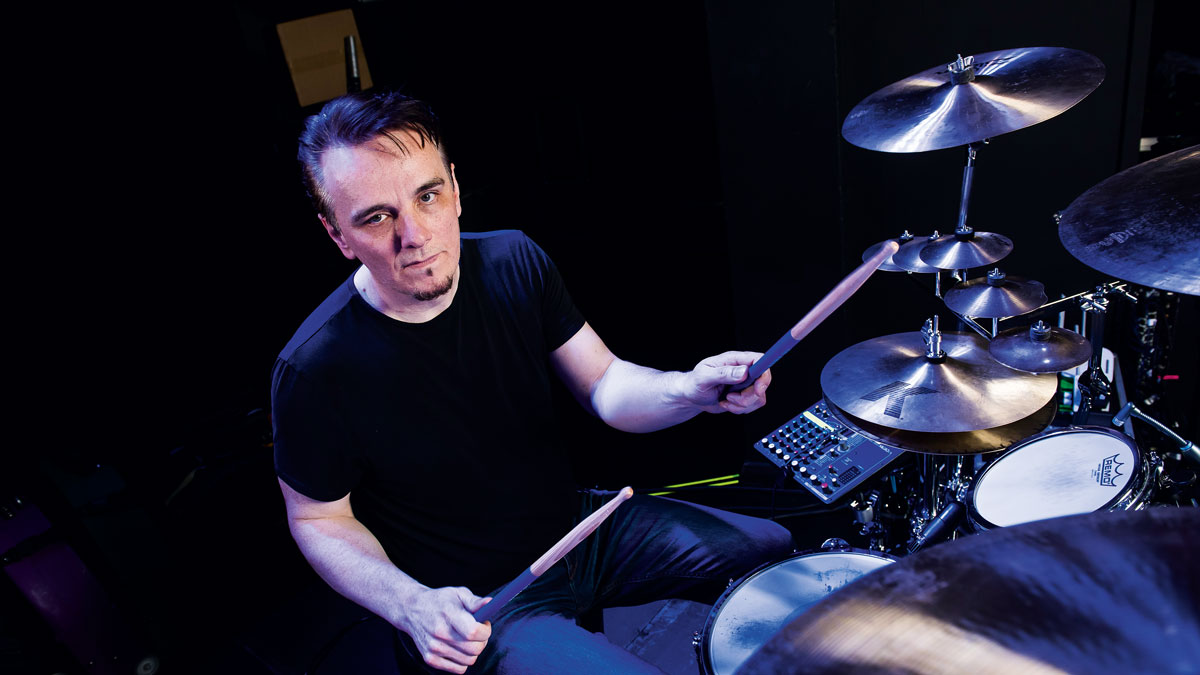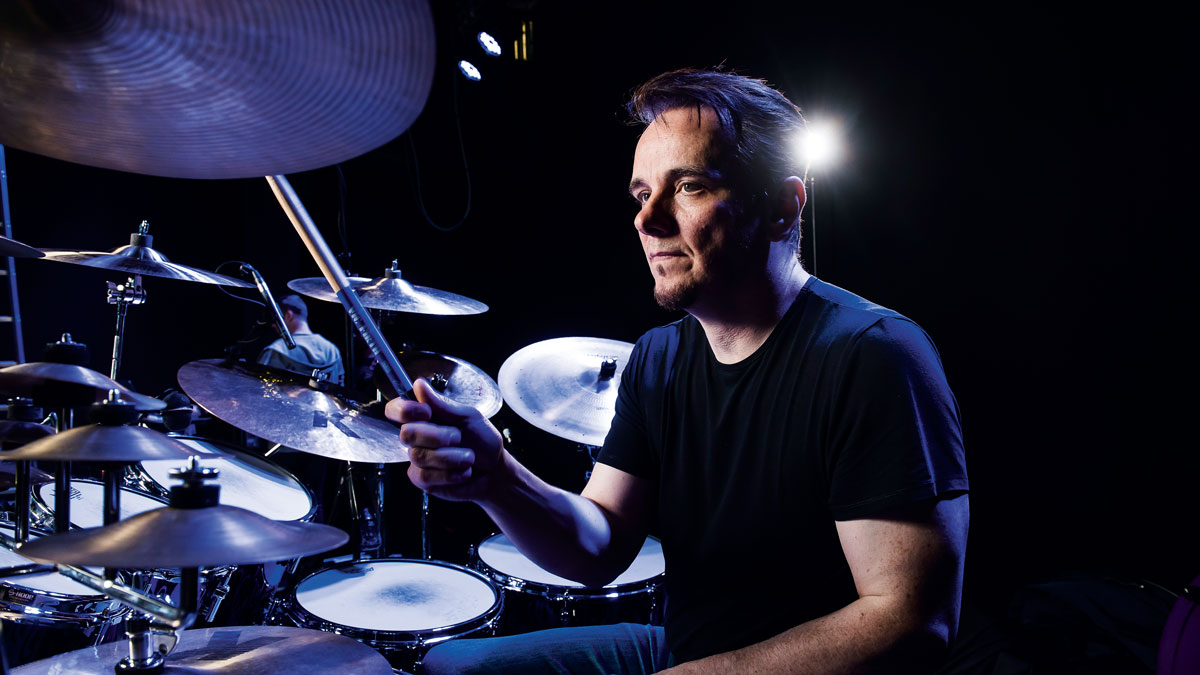Prog drum king Gavin Harrison: "If everything's under control, then you’re just not going fast enough"
King Crimson, The Pineapple Thief and why success should only be measured in happiness

Wisdom from the King Crimson man
"It’s like Mario Andretti said about driving a Ferrari, if everything is under control, then you’re just not going fast enough,” says Gavin Harrison.
“There should be some seat of the pants moments in every concert. If you’re just so in control, some of the fun can go out of playing live. There should be moments where you take a few chances.”
Harrison’s career suggests he’s never been shy about taking chances. Originally a session drummer, covering the gamut from Lisa Stansfield to Iggy Pop, he joined Porcupine Tree in 2002 where he established his reputation for crafting ingeniously creative, technically prodigious grooves. He’s been a member of Robert Fripp’s progressive rock leviathan King Crimson since 2008, sharing the demanding drumming duties with Pat Mastelotto and Jeremy Stacey.
When we meet Harrison, he’s touring with The Pineapple Thief in support of their excellent record Your Wilderness. The only downside to being so busy, he says, is the lack of time to practise.
“I’ve tried to play new things as the years have gone on,” he says, “so it’s very important to me to have time to develop, to have new ideas and ways of thinking that I haven’t done before.”
You were approached to play on Pineapple Thief’s album Your Wilderness, was that just a session?
“Yeah. It happens to me quite a lot these days that people contact me either through friends or through Facebook and ask if I would play on their songs.
"Sometimes I know them, sometimes I don’t know them and when I don’t know them I always say, ‘Send me the tracks because I need to feel that I can make a good connection to the music and make a meaningful contribution.’
"I’m much more interested in making a contribution than just being a straight session drummer where they’ve already written the part on a drum machine and they just want me to play exactly that. It’s much more interesting if someone sends me a song and I think, ‘Oh, I’ve got some good ideas I could play on this song.’
It’s like Mario Andretti said about driving a Ferrari, if everything is under control, then you’re just not going fast enough
“Then we get to the point of talking about schedule and money, but there’s no point talking about the schedule or the money if I really don’t like the music or I have no creative thoughts when I listen to it.
"At this point most people contact me because they want me to do my thing, rather than the decades I spent as a session drummer where you were just asked to play whatever the producer or the artist wanted and if you weren’t available, another session drummer would do.
"They didn’t really particularly want you to put your character all over it so that’s why it’s more fun collaborating rather than just being a session man. I did that for decades, that’s fine, it’s great, but I’m not really interested in doing that anymore.”
Is there an exchange of ideas with The Pineapple Thief where they might change a song in response to your drum part?
“Absolutely. Sometimes I’m working on a song and I might call them and say, ‘I’ve got an idea for the bridge because I think it should be much heavier than you’ve got it now. I’ll just put it together, send you a mix, and tell me what you think.’
"There was one particular Pineapple Thief song where it had this really long section with this riff in 4/4 and I thought actually it would be more fun if it starts in 4, then it goes to 7, then to 6, then to 5, and it feels like it’s got some arc to it and the intensity is getting squeezed because the bars are becoming shorter.
“I called Bruce, the singer of The Pineapple Thief, and said, ‘This section in the middle, do you mind if I chop it all up into little bits?’ and he said, ‘Please do!’ It’s a dream scenario where I could sort of do no wrong.
"Obviously, Bruce and the guys have heard the songs a thousand times, so to give them to someone with new ears who is listening for the first time, that gut instinct is sometimes the best way to go. If you think the intro is too long, let’s try chopping it in half.
"Sometimes it works, sometimes it doesn’t, but it’s a more collaborative arrangement. Also for the live show, they sent me some old songs which obviously I didn’t play on and they said, ‘Rearrange them however you want,’ so I did. That’s what they were looking for, a new approach to an old song.”

From studio to the road with Pineapple Thief
Were you pleased that they asked you to tour the album?
“Yeah. I mean this is one of the most successful home sessions that I’ve ever done in that I didn’t know them before they contacted me, they sent me the songs, I liked the songs, I played on the songs. I even mixed the drums, so I only gave them a stereo mix.
"I’m a bit of a control freak and nine times out of 10 when somebody else mixes my individual drum tracks, I’m really, really disappointed. The sound is very much part of the rhythms and the ideas I came up with. They go hand-in-hand.
"With a different sound, I would have different ideas, so the sound and the rhythms and the architecture of the design of the piece was all one thing in my mind.
“I said, ‘I really want you to use my stereo mix because it’s got the right amount of live ambient room, the right amount of ghost notes, the right amount of volume, the relative levels are exactly how I intended the drums to be,’ so I just sent them stereo mixes and they were very happy with it.
"After that, they said ‘Would you consider doing a short tour?’ I thought, yeah, why not? It’s been a long time since I played in another band and it’s a nice thing to do in juxtaposition to King Crimson, which is a completely different band.
"They’re not as big as King Crimson but it’s not really about the size of the audience. I view success in happiness. If you’re happy, then you’re successful. If you measure everything in numbers, you’ll never be happy because the numbers will never be big enough.”
Nine times out of 10 when somebody else mixes my individual drum tracks, I’m really, really disappointed
Is it a gamble to accept a tour because you’re committing to sitting in a bus or van with a group of strangers for weeks on end?
“I think the clue is in the music to a degree. I’ve worked professionally for so many years that I start to recognise people’s personalities through their playing, whether they’re a drummer, bass player, keyboard player, guitarist or singer.
"It happened to me a lot when I worked in Italy, working with musicians who I couldn’t really even converse with, I felt their character through their playing. It’s a sort of sixth sense.
"Sometimes people send me music to potentially play on and I can hear some big egos and think, ‘I don’t think I’m going to like this person by the way they’re playing.’
"It was a small gamble because I didn’t know Bruce and Steve, John and Darren, but I liked the music and there is a nice amount of space in the music. It didn’t feel like anyone’s got a massive ego that they were trying to fill up lots of sound and frequencies with lots of notes, so I didn’t think they would be bad guys, and I was right.”
You’ve done two excellent albums with Russian progressive duo Iamthemorning. Had you met them beforehand?
“No, I had no connection at all. Marjana, the singer, wrote to me on Facebook and said, ‘Are you available to do a session?’ I gave them my stock answer and she sent me the stuff and I really liked their compositions and I could hear some nice drum parts and textures I could do.
"Then Gleb, the piano player, asked me to play on his record about nine months ago. It’s absolutely fantastic and it’s coming from purely classical piano and he’s a genius on the piano; he’s got a very nice sense of rhythm and composition.
"There’s no manual on how to play drums with classical piano and that’s very interesting so I could just make my own path. If someone sends you a death metal track, then there’s lot of examples of how you should play in that type of music and the drum sound you should go for and the stylistic things you should do.
"Playing with classical piano, it was virgin territory to me so I found that very exciting. There was no clue about what to play on the drums, no drum machine, no bass part, so I joined in some of the melodies, sometimes I played straight, sometimes I played counter-rhythm to his rhythms.
"I get more excited about designing a rhythmical architecture for a piece than ever thinking of flashy drum fills or scoring points with amateurs and beginners by how fast I can play.”

The joy of the solo
In King Crimson, are you, Pat Mastelotto and Jeremy Stacey influencing one another from playing together?
“Oh yeah, surely. It’s very strange and very educational for me to hear Pat and Jeremy play and, quite importantly, how they play their time, because everyone plays time in a slightly different way.
"It’s like a DNA thing, the way that you place your bass drum, snare drum and hi-hat against each other. Your internal sync is one thing and then how you synchronise with the music or if there’s a click is another thing.
"Everybody does those things differently, slightly. It’s noticeable on the drums more than any other instrument, to me, so they make the music feel different to the way I do but we’ve all got a very slightly different concept of where the beats should go, which can be a little difficult if you’re going to play parts that are exactly in-between each other.
“If you’re going to play a 16th note offset to someone, you need to listen very carefully to the person playing on the beat. You need to base your time off their time, rather than the other way around.
"There are definitely moments where two of the drummers are playing a more percussive part and one drummer is playing the main lead part. Whoever is playing the lead time, you need to slightly bend your way of thinking about time to fit in with the person leading.”
Is this a very orchestral way of playing?
“You’d do the same thing if you’re playing third cello. The rule is that you don’t play in front of the lead cellist. The lead cellist or the lead violinist, the leader of any section, they are always at the front of the time.
"It’s an unwritten rule and you will be taken outside and shot if you find yourself getting a note in before the leader of your section. You play behind the leader of your section, that’s how it works and usually the hierarchy is the best cellist is the lead one, and the others follow them so it sounds the strongest.
“Same with the violins, the violas and so on. Same with the lead trumpet player. The lead trumpet player is going to play the highest note and he’s going to dictate the way the trumpets are going to play the phrase and the time, if it’s going to be laid-back or pushed or whatever, they follow the lead trumpet, that’s how it sounds good.
"So yeah, it’s an orchestral approach in that sense and King Crimson is a very orchestral rock’n’roll band. Now it’s an eight-piece band and we don’t do any production, there are no lights, no explosions, no dancing dwarves or snakes or spiders or anything like that.
"There’s no blood, most nights, and it’s just white light all night, so no strobes. No distraction. You’re just coming to hear the music. You’re not coming to look at some enormous film, some 3D animated stop-time film that you’re watching. It’s just about the musicians on stage playing.”
There’s no blood, most nights
You play a different drum solo every night for 21st Century Schizoid Man. That must be a challenge!
“It would be very easy for me to work out a solo which included all the clever-ass things I’ve learned and I could probably impress the audience and would certainly impress any beginners and amateurs, but it wouldn’t impress the band and it wouldn’t impress me because I’d be bored s**tless with it.
"The real challenge is not playing the solo, the real challenge is to play a different solo every night. I’ve gone through various stages of working out something in advance to leaving it to chance right to the last second. Leaving it to chance right to the last second can give the best result because then you’re really on the edge of your wit.
"The fun is when you’re on the absolute knife edge and it goes well. Some nights go better than others as with any improvisation but I like to think I’ve played the drums long enough in my lifetime that I could pull myself out of a nosedive.
"It’s never gone to the point where I’ve played something absolutely horrible and stopped. If you’ve got the knife edge mentality you can sense very quickly when it’s not going well and make a correction. I think lots of drummers can do that. It’s the same when you improvise a drum fill.
“Before I play the drum solo I don’t actually play for about three minutes. There is a moment where Jeremy Stacey is playing and there’s a sax solo so I sit there, I listen to Mel Collins playing the sax, because sometimes he plays some phrases and I think, ‘Actually, I could start off by playing that phrase,’ or Tony [Levin] might play some rhythmical figure on the bass and something might happen during the three minutes that I don’t play that I think, ‘I could bring that and put it into this context.’
"I don’t like playing drum solos unless they’re in context. I hate getting up on stage and someone says, ‘And now Gavin’s going to play a drum solo.’ Well, that’s the time when you normally just regurgitate all your favourite fills and licks and it’s very disappointing.
“There is something very rehearsed about it and I can tell when a drummer is doing something that they’ve practised for thousands of hours or not. If you want to impress young kids then it’s really just about going fast and maybe spinning sticks. You’ll get a round of applause. I’m not interested in that.
"I’m interested in really seeing how far I can go. I’m going down black corridors and I don’t know how deep the corridor is and if there is going to be a door at the end and it’s kind of exciting.”